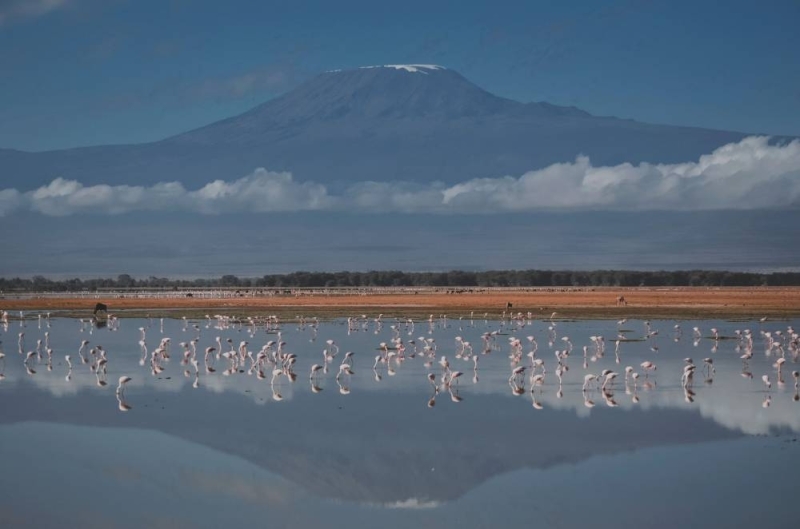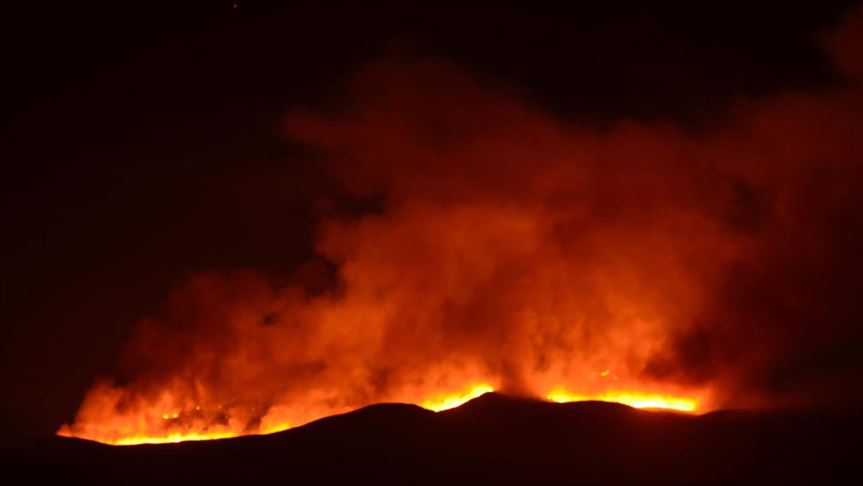Taz Ali - Yesterday
While most global leaders’ attention is on the Ukraine war, the world’s bloodiest armed conflict continues to rage in the northern Ethiopian region of Tigray, where half a million people are thought to have died.

A soldier from the Ethiopian National Defence Force (ENDF) in Kombolcha, Ethiopia. An estimated one million troops are engaged in fighting in the war in Tigray, which has raged on for nearly two years (Photo: Amanuel Sileshi/AFP)© Provided by The i
The Ethiopian military and allies including troops from neighbouring Eritrea have been battling Tigray forces on and off for two years.
The conflict has displaced millions of people and a near total blockade of the Tigray region has left hundreds of thousands on the brink of famine.
On the battlefields, an estimated one million troops are engaged in the offensive, making it the biggest conflict in the world right now, according to Kjetil Tronvoll, an anthropologist and conflict professor at Oslo New University College in Norway.
That figure was also confirmed by General Tsadkan Gebretensae, one of the leading generals in Tigray, who claimed up to 75 per cent of fighting troops are Ethiopian and Eritrean forces.
According to Professor Tronvoll, whose more than 30 years of research and fieldwork has focused on Ethiopia and Eritrea, the military strategy used by Ethiopian troops mirrors that of the First World War: using infantry to push large “human waves” of soldiers to breach Tigrayan defence lines.
He said it was likely as many as 100,000 soldiers have been slaughtered in recent weeks.
“You have thousands of troops running over the field trying to reach the enemy line, and of course the first, second and third wave will be shot down,” Professor Tronvoll told i.
“But then when the fourth wave comes, the Tigrayan forces have run out of ammunition or are overrun.
“So they manage to advance some few hundred metres, this is what happened in the First World War on the continental battlefields, and we know the same tactics were used in the 1998-2000 war between Eritrea and Ethiopia.
“It’s a carnage of unbelievable proportions. This is the most bloody armed conflict happening in the world today.”
And the number of casualties could keep climbing, he argued, as Ethiopia gains the upper hand in the conflict after capturing the Tigrayan towns of Shire, Alamata and Korem.
The loss of the strategic town of Shire came as a blow to Tigrayan forces. It is one of the region’s biggest towns with an airport and road links to the regional capital Mekelle, which Ethiopian forces believe is within their grasp.
“They believe they can reach Mekelle and kill off thousands of the junta,” said Professor Tronvoll.
“One thing we know about the history of Tigray – and I have been studying that history for over 30 years – when they say this is an existential war and they will never give up, that is true, that is proven.”
Though there have been repeated condemnations from around the world and demands for humanitarian access into Tigray, Professor Tronvoll criticised the lack of meaningful action from the West.
He questioned why Western leaders are “playing the plausible deniability card” in not showing the same amount of care for Tigray as they are for Ukraine, and suggested targeting the Ethiopian economy – as the West has done with sanctions against Russia – to force it to accept a negotiation process.
Soaring inflation – which reached a 17-year high of 20.5 per cent in August – has crippled Ethiopia’s economy, driven by the rising cost of imports due to a shortage of foreign currency and increasing cost of production.
Ethiopia has sought help from the International Monetary Fund (IMF) to restructure its debt, but progress has been delayed partly due to the civil war, Reuters reported.
The country’s finance minister, Eyob Tekalign Tolina, acknowledged the conflict was a key factor in the delay, but he said he hoped there would be peace talks in “the coming few weeks”.
The African Union (AU), consisting of 55 member states in the continent, has pursued peace negotiations but the group itself presents its own problems.
The Tigrayan regional government expressed reservations about the impartiality of General Olusegun Obasanjo, the former leader of Nigeria, who was “hand picked” by the Ethiopian Prime Minister Abiy Ahmed to lead negotiations under the AU, Professor Tronvoll said.
The AU has scheduled peace talks between the warring parties in South Africa on Monday, having postponed a previous meeting on 8 October due to logistical and technical issues.
Professor Tronvoll is not convinced the peace talks will lead to a solution to end the war.
“They (Ethiopian and Eritrean forces) have had the upper hand in the past few weeks, they’re not interested at all to negotiate, they see that it is a possibility to win this by arms,” he argued.
“The West is happy to say that this is an AU-led process – AU and Ethiopia is projecting the slogan ‘African solutions to African problems’.
“It gives us (in the West) an excuse to say it is really the AU who is leading the process so we need to take the back seat.”

:quality(70)/cloudfront-eu-central-1.images.arcpublishing.com/thenational/PXCV7UXYH3RVKUAXA2UBVFM3AM.jpg)




